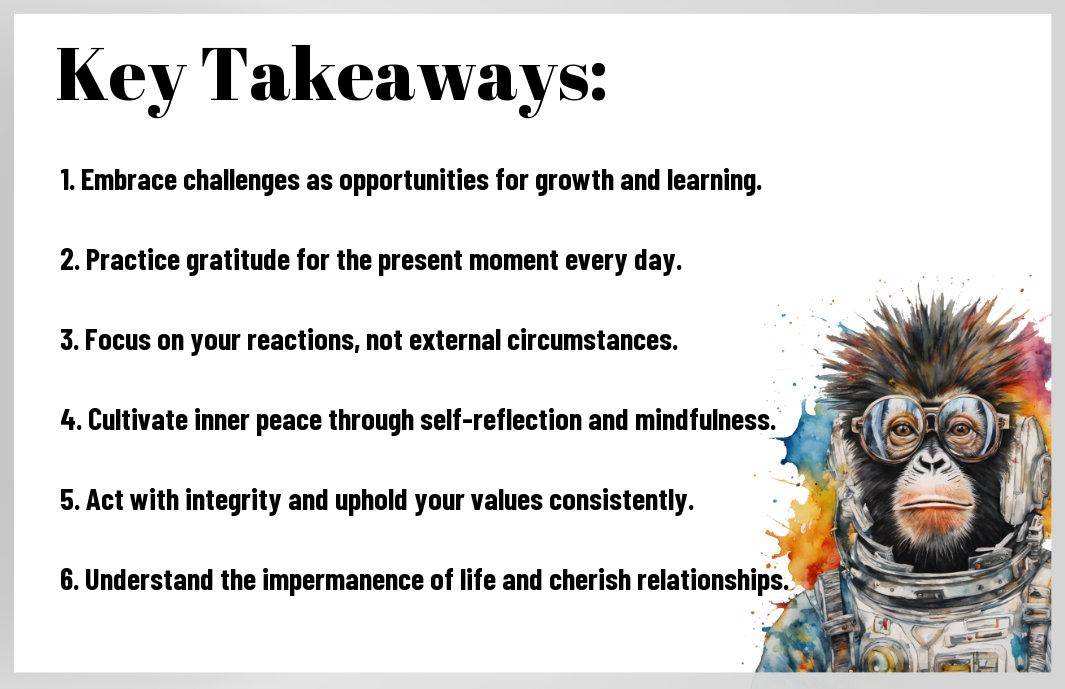
Newsletter Subscribe
Enter your email address below and subscribe to our newsletter

Enter your email address below and subscribe to our newsletter

Wisdom can often be found in the writings of the past, and I believe that Marcus Aurelius, the Roman Emperor and Stoic philosopher, has timeless lessons to share with us today. His reflections on life, resilience, and personal growth resonate even in our modern world. In this post, I’ll explore some of his key teachings and how they can help you navigate the complexities of life, improve your mindset, and embrace a more purposeful existence. Let’s examine the insights of this remarkable thinker together!


Your journey to understanding the wisdom of Stoicism can profoundly affect how you approach life. Stoicism, as taught by Marcus Aurelius, encourages us to explore the depths of our thoughts and emotions. It helps us recognize that we have the power to choose our reactions to every situation we face. I find this philosophy enriching, as it prompts me to reflect on my actions and decisions rather than react impulsively. In a world full of distractions, embracing Stoicism can guide you toward living with intention and purpose.
To cultivate a life full of joy and meaning, embracing the present moment is crucial. Marcus Aurelius often emphasized the importance of focusing on the here and now, reminding us that the past is gone and the future is uncertain. I appreciate how this perspective invites you to engage with the world around you without lingering in regrets or anxieties. When I practice this mindset, I open myself up to fully experience life’s beauty, fostering a deeper connection to myself and others.
To navigate life’s challenges with resilience, you can draw inspiration from the Stoic philosophy of finding strength in adversity. Marcus Aurelius believed that obstacles are an integral part of the human experience, teaching us valuable lessons along the way. When I encounter difficulties, I remind myself that resilience is built through these experiences, and my response to challenges defines my character. This mindset shifts how I perceive setbacks, transforming them into opportunities for growth rather than sources of despair.
Plus, finding strength in adversity is not just about enduring hardship; it’s about transforming it into a catalyst for personal development. I often reflect on the idea that every struggle can cultivate virtues like patience, courage, and wisdom. By changing my perspective on adversity, I empower myself to tackle even the toughest situations with grace and determination. When I embrace my challenges, I emerge stronger and more equipped to face whatever life throws my way.

Against the hustle and bustle of our daily lives, I often find that taking a moment to pause and reflect can work wonders. Marcus Aurelius emphasizes the importance of self-awareness and mindfulness through his writings, reminding us to observe our thoughts and actions. By dedicating a few minutes each day to sit quietly and check in with myself, I’m able to clear my mind, center my thoughts, and cultivate a sense of inner calm. This practice not only helps me navigate challenging situations more effectively but also deepens my appreciation for the present moment.
By embracing mindfulness, I create space for reflection, allowing me to engage with my emotions and thoughts constructively. I find that asking myself questions—like “What can I learn from today?” or “How did I respond to challenges?”—fosters personal growth. Each evening, I like to jot down my thoughts in a journal, capturing insights and lessons that may otherwise slip away. This practice solidifies my learning and prepares me for whatever the next day may bring.
One of the key insights from Marcus Aurelius is the transformative power of perspective. I’ve realized that the way I perceive a situation can greatly influence my emotional response. When I encounter obstacles, instead of viewing them solely as negative experiences, I challenge myself to see them as opportunities for growth and resilience. By reframing my thoughts in this manner, I allow myself to navigate life’s difficulties with a more open and adaptive mindset. This shift in perspective has truly changed how I approach challenges.
With each challenge, I try to ask, “What positive outcome can come from this?” or “How can I grow from this experience?” By focusing on the lessons and opportunities within each situation, I’m able to maintain a healthier emotional landscape. It helps me cultivate gratitude and optimism, reminding me that life’s trials are often the pathways to strength and wisdom. By embracing this perspective, I find myself better equipped to face whatever life throws my way.
After stepping into the teachings of Marcus Aurelius, it becomes clear that effective leadership is not just about directing others but also about nurturing your own personal growth. Aurelius emphasized the importance of self-examination and reflection, which I find incredibly helpful when navigating my own leadership journey. By actively engaging in introspection, I can identify my strengths and weaknesses, allowing me to develop a more authentic and effective leadership style that inspires trust and respect from those around me.
Between the pages of “Meditations,” I discover that leading by example is more than a mantra; it’s a vital practice. When I align my actions with my values, I set a standard for others to follow. Whether in my personal life or professional settings, embodying the principles I advocate for creates an environment where others feel motivated to emulate those behaviors. If I want to inspire honesty, integrity, and hard work, I must first practice those qualities myself, creating a ripple effect that fosters collective growth.
One of the standout teachings from Aurelius is the idea of cultivating resilience in the face of challenges. Life is unpredictable, and I have certainly faced my share of hurdles. Instead of viewing these obstacles as setbacks, I remind myself that they are opportunities for growth. By embracing adversity and learning from each experience, I build my mental toughness and adaptability, crucial traits for any leader. This approach empowers me to lead with a calm and composed demeanor, even during turbulent times.
Consequently, developing resilience not only strengthens my character but also enhances my capacity to support and uplift others. By facing challenges head-on, I create a space for my team to understand that stumbling is part of the process. As I navigate obstacles with grace, I set a tone that encourages others to persevere through their own trials, fostering a community of resilient individuals eager to learn and grow together.
Unlike many philosophers who focused on the individual experience, Marcus Aurelius understood the importance of connecting with others. As emperor, he was constantly surrounded by people, and despite the weight of his responsibilities, he recognized that our shared humanity is what binds us together. By fostering connections with those around us, I can cultivate a more supportive and harmonious environment, both in my personal life and within my community. This ancient wisdom is relevant today as we navigate a world that often feels isolating and disconnected.
On a practical level, Marcus Aurelius emphasized the need for empathy in our interactions. He believed that understanding the thoughts and feelings of others allows us to respond thoughtfully rather than react harshly. When I seek to understand someone else’s perspective, I cultivate compassion and kindness, which helps establish a deeper connection. Empathy can transform conversations and bridge gaps between differing views, especially in a world filled with varying opinions and beliefs.
The process of building stronger relationships starts with genuine communication and active listening. I’ve found that when I take the time to really listen to others, I open the door to meaningful connections. Engaging in conversations that reflect my willingness to understand their experiences fosters a sense of belonging and trust. Not only does this enrich my relationships, but it encourages a two-way street of support where we can help each other grow and overcome challenges.
Even small gestures of kindness and understanding can go a long way in strengthening the bonds I share with others. A simple smile or a thoughtful question can ignite a sense of camaraderie. In my own experience, I’ve noticed that the more I invest in understanding those around me, the more enriching my relationships become. By taking these steps, I’m not only adhering to Aurelius’ teachings but also paving the way for a more connected and harmonious life.
Now, as I reflect on the teachings of Marcus Aurelius, I find valuable insights that resonate deeply with my own struggles. One of the most poignant lessons is about confronting our fears and anxieties. Aurelius often reminded us that the mind is a powerful tool, and it can either amplify our worries or help us gain clarity. When I face situations that cause me distress, I realize that my emotions can sometimes distort reality. By taking a step back and analyzing what I fear, I can often see that the daunting shadows are merely figments of my imagination, waiting to be illuminated with rational thought.
Around each corner of life, fear and anxiety lurk, ready to pounce at any moment. Whether it’s the fear of failure in a new venture or the anxiety of not meeting expectations, I’ve learned that acknowledging these feelings is the first step toward overcoming them. By understanding that everyone experiences fear, I feel a sense of camaraderie with others facing similar challenges. I can then choose to act despite the fear, transforming it into a force that propels me rather than hinders me.
Along my journey, I’ve come to see that obstacles can often present the best opportunities for growth. Marcus Aurelius taught that life’s challenges are not to be avoided but embraced. Each setback can serve as a lesson, a way to better equip myself for future endeavors. I find that rather than allowing obstacles to discourage me, I try to reframe the situation and consider what I can learn from it. This shift in mindset helps me remain resilient and adaptable, allowing me to turn what seems like a roadblock into a stepping stone.
Hence, by embracing this perspective, I discover avenues I might never have explored otherwise. When a project doesn’t go as planned, I take the time to analyze the situation, asking myself what I can take from that experience. This often leads me to innovative solutions or encourages me to develop new skills. What I once perceived as insurmountable challenges have transformed into gateways for personal and professional growth, reminding me that the journey itself is just as important as the destination.
Despite the challenges we face in our modern lives, the teachings of Marcus Aurelius can offer us valuable guidance. By cultivating self-awareness and developing a resilient mindset, I find that I can approach each day with a sense of purpose and clarity. His emphasis on the importance of virtue resonates with me, as it encourages me to focus on what truly matters—my actions, my reactions, and the legacy I leave behind. I believe that embracing Stoic principles can help us navigate the complexities of life with a more serene outlook.
With a few simple practices, I can incorporate Stoicism into my everyday life. For instance, starting my day with a moment of reflection helps me align my intentions and set a positive tone. I often take a few deep breaths and think about the challenges I might encounter, preparing myself to respond thoughtfully rather than react impulsively. Additionally, keeping a gratitude journal allows me to focus on the positives and appreciate the present moment, reminding me of the importance of perspective even amid challenges.
An important aspect of applying Aurelius’ teachings is recognizing how my journey can inspire those around me. By sharing my experiences and the lessons I’m learning along the way, I can create a ripple effect, encouraging others to explore Stoicism in their own lives. Every time I discuss how I’m working on my emotional resilience or practicing mindfulness, I hope to spark curiosity in others and invite them to join me on this path of growth.
With each step I take toward embracing Stoicism, I find that my journey becomes more than just a personal endeavor; it becomes a shared experience that uplifts my community. By openly discussing how I handle adversity or make choices based on virtue, I build connections with others who might be facing similar struggles. When I share the impact that Aurelius’ wisdom has had on my life, I hope it inspires someone else to launch on their own path of self-discovery and resilience, continuing the cycle of growth and support amongst us all.
To wrap up, I find that the teachings of Marcus Aurelius resonate deeply with our daily lives, encouraging us to cultivate a mindset of resilience and acceptance. His emphasis on self-reflection and personal responsibility invites you to take control of your reactions and thoughts in an increasingly chaotic world. Whether it’s managing stress at work or navigating personal challenges, I believe his Stoic principles offer practical guidance that we can all apply. If you’re interested in diving deeper into these concepts, check out this insightful resource on Life Hacks from Marcus Aurelius: How Stoicism Can Help Us.
By embracing the wisdom of Marcus Aurelius, I encourage you to find strength in adversity and prioritize your inner peace. His perspectives on mindfulness, gratitude, and the impermanence of life provide a refreshing lens through which we can view our own experiences. I truly believe that by integrating even small elements of his teachings into our daily routines, we can cultivate a life that is more intentional and fulfilling. So, let’s take these lessons to heart and strive to be the best versions of ourselves, for our own well-being and those around us.
A: Marcus Aurelius emphasized the importance of self-reflection, resilience, and virtue. His teachings encourage individuals to maintain a sense of duty and responsibility, focus on personal growth, and practice mindfulness. He believed that by understanding our thoughts and emotions, we can lead a more fulfilling life. His emphasis on rational thinking and acceptance of things beyond our control offers a guide for navigating modern life’s challenges.
A: Stoicism teaches that while we cannot control external events, we can control our reactions to them. By applying this principle, individuals can manage stress more effectively. Marcus Aurelius advocated for reflecting on our thoughts and choosing to respond calmly to difficulties. This mindset encourages resilience and helps diminish feelings of anxiety by fostering acceptance and rational thought.
A: Marcus Aurelius highlighted the importance of empathy and understanding in human interactions. By practicing kindness and recognizing the common struggles among people, we can foster stronger bonds. His teachings suggest that viewing others as fellow travelers with their own challenges can enhance compassion and improve communication, leading to healthier relationships.
A: Absolutely. Marcus Aurelius promoted the idea of serving others and leading by example. His reflections emphasize the importance of integrity, accountability, and ethical behavior in leadership. By adopting his stoic principles, modern leaders can inspire teams, navigate crises, and cultivate a positive work culture that prioritizes the well-being of individuals.
A: His writings encourage continuous self-improvement and introspection. Marcus Aurelius believed in the pursuit of virtue and knowledge as lifelong endeavors. By reflecting daily on one’s actions and values, individuals can identify areas for growth. His focus on aligning personal goals with ethical principles can motivate others to strive for a purpose-driven life.
A: Mindfulness is central to Marcus Aurelius’ philosophy. He advocated for being present and fully aware of one’s thoughts and feelings. His practice of journaling served as a means to enhance self-awareness and cognitive clarity. By adopting mindfulness techniques, individuals can apply Marcus’ teachings to cultivate a deeper understanding of themselves and improve their mental well-being.
A: Incorporating Marcus Aurelius’ teachings into daily life can be done through practices such as journaling, reflection, and setting intentions. Individuals can start their day by contemplating their values and goals, practicing gratitude, and reviewing challenges they might face. Establishing routines that promote self-reflection encourages alignment between actions and personal beliefs, making his teachings practical and applicable.